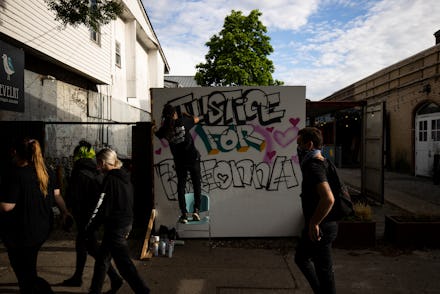Louisville just banned no-knock warrants, but still hasn't arrested Breonna Taylor's killers

The city council in Louisville, Kentucky, unanimously approved a measure to ban no-knock warrants on Thursday evening, calling the new ordinance "Breonna's Law" after the 26-year-old Black woman killed by police officers in her own home last month. The woman, Breonna Taylor, was shot and killed by police officers who forced their way into her home while executing a search warrant related to a drug investigation of an entirely different person.
Flanked by family members and her attorney, Ben Crump, Taylor's mother Tamika Palmer said she was "grateful" for the new law, explaining that as an EMT, "all [Breonna] wanted to do was to save lives. So with this law, she will be able to continue to do that."
In addition to banning no-knock warrants within city limits, the city council's measure also mandates all police officers be wearing body cameras while serving any warrants, and that those cameras must be capturing footage for at least five minutes before the warrant is served.
Louisville Mayor Greg Fischer (D) has pledged to sign the new ordinance into law "as soon" as he receives it.
The city's new ordinance came the same day as Kentucky Sen. Rand Paul (R) introduced an equivalent to Breonna's Law in the Senate, entitled the "Justice for Breonna Taylor Act," which would similarly ban no-knock warrants for federal law enforcement officials and limit Department of Justice funds for local law enforcement agencies that continue the practice.
"After talking with Breonna Taylor's family, I've come to the conclusion that it's long past time to get rid of no-knock warrants," Paul explained in a statement announcing his proposed measure. "This bill will effectively end no-knock raids in the United States."
Breonna's Law comes as part of a renewed wave of local efforts to combat police brutality and inequality in law enforcement, following the death of George Floyd in Minneapolis last month. In New York, State Assemblyman Felix Ortiz has introduced a bill to make racially motivated 911 calls a hate crime, after Amy Cooper, who is white, threatened to call police on Christian Cooper, who is Black, and tell them he had threatened her life, after he'd simply asked her to put her dog on a leash in New York's Central Park.
But while Louisville's new ordinance has been hailed as a positive step toward meaningful police reform, its effectiveness is tempered by the fact that none of the police officers responsible for Taylor's death have been arrested or charged with a crime. Indeed, the night before the city council voted to pass Breonna's Law, the Louisville Police Department released their incident report from the evening of Taylor's death. The document, just four pages long, is conspicuously lacking in many places, including the section where it lists her injuries as "none." Taylor was shot eight times by officers. The report also says police did not force entry into Taylor's home, even though they used a battering ram to break down her door.
"It’s issues like this that erode public confidence in [Louisville Metro Police Department]’s ability to do its job, and that’s why I’ve ordered an external top-to-bottom review of the department," Fischer said in a statement. "I am sorry for the additional pain to the Taylor family and our community."